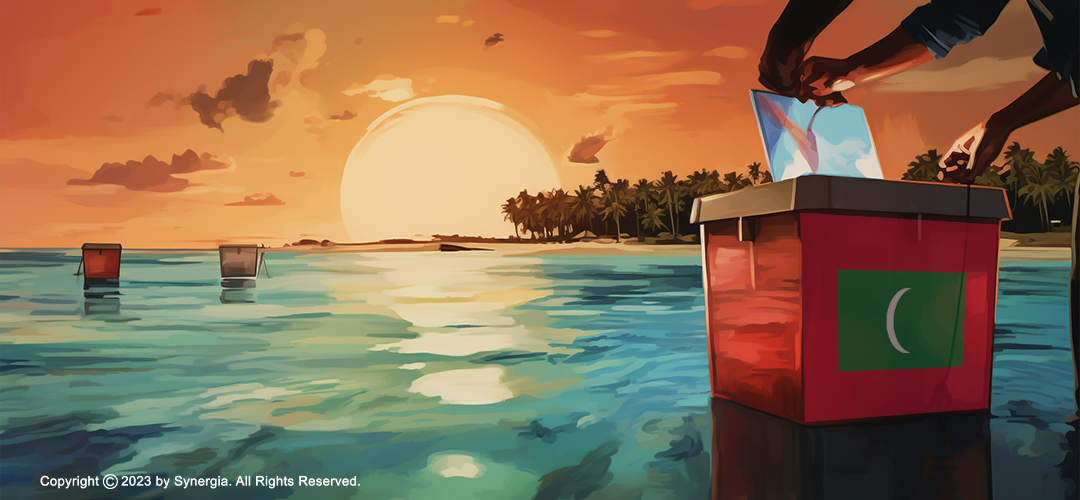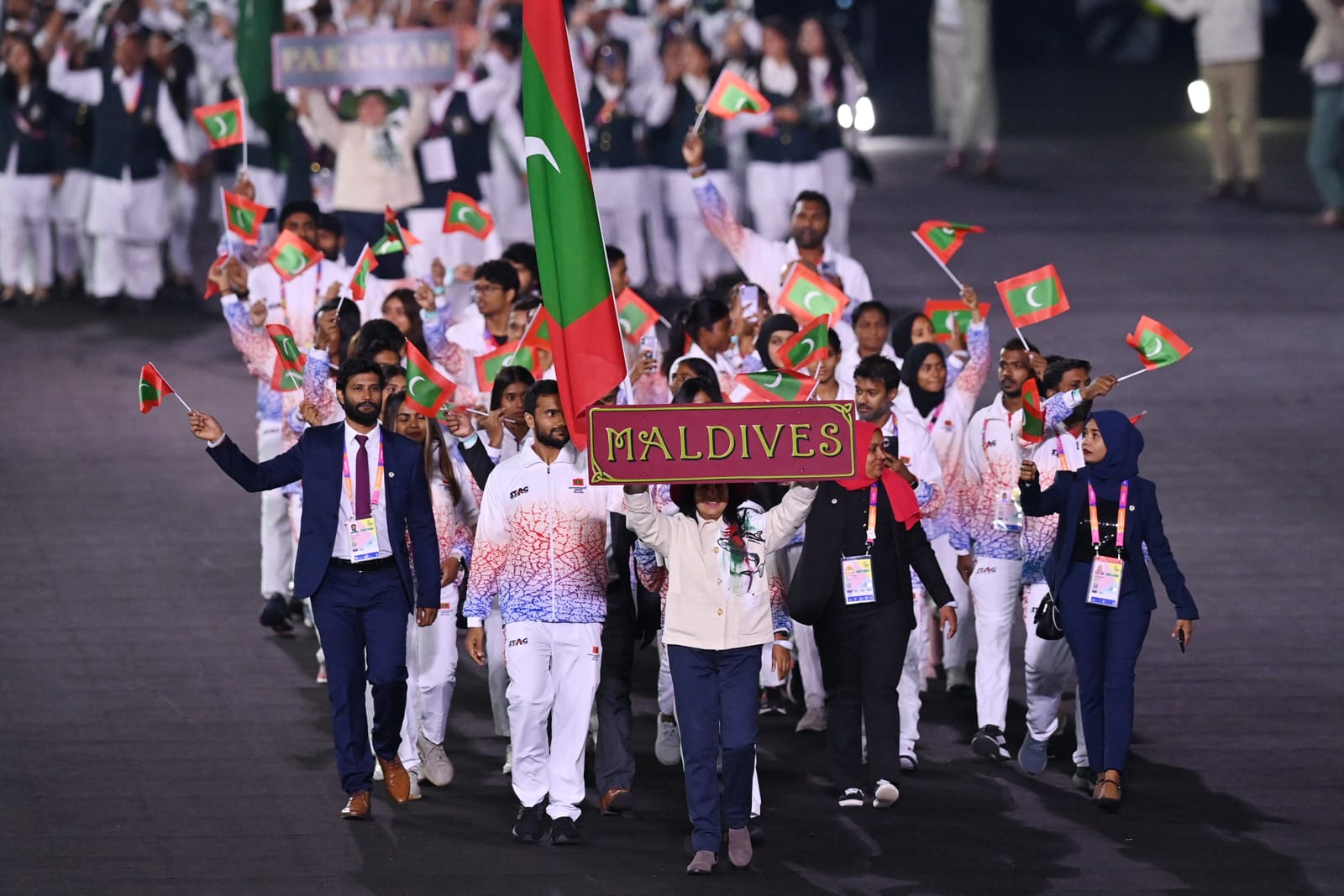Maldives: Critical Elections Ahead
July 22, 2023 | Expert Insights

The upcoming presidential elections of the Maldives in September will not just shape the future of the country but will also significantly affect regional geopolitics. The Maldives is a presidential democracy, and the critical battle for the nation's highest office will mainly play out between the Maldivian Democratic Party (MDP) and the Progressive Party of Maldives (PPM).
The crucial election is being closely watched by regional powers, particularly India and China. As the two regional heavyweights vie for influence, both powers are aware of the geopolitical significance of the Maldives. The Maldives’ domestic politics are intertwined with this regional rivalry.
Background
Despite its small size, the Maldives is strategically important given its central location in the Indian Ocean, making it attractive to both China and India as they jostle for strategic advantage over the vast open expanses of the Indian Ocean.
China has two major justifications for expanding its naval presence in the Indian Ocean. First, to maintain control over the Malacca Straits, a key trade channel for China, and second, to advance its Belt and Road Initiative (BRI) and Maritime Silk Road (MSR), which connect infrastructure and transport projects in several countries. China's aggressive naval and military expansion and its strategic loans have led to its growing regional influence.
India is keen to maintain its sphere of influence in South Asia with Prime Minister Narendra Modi’s Neighbourhood-First foreign policy. China’s expanding presence also poses security concerns; India wants to prevent it from forming a “string of pearls” or naval bases around India. This regional rivalry is bolstered by longstanding border disputes and China’s close relationship with Pakistan.
In the past, the Maldives and India have shared close ties, encouraged by geographic proximity and socio-cultural connections. India’s support towards the Maldives goes back to 1988 when India’s Operation Cactus helped President Maumoon Qayoom defeat an attempted coup by the People Liberation Organization of Tamil Eelam. Maumoon continued in office for 30 years until Mohamed Nasheed took over as the first democratically elected President.
While Nasheed shared friendly relations with India, his government faced flak for awarding an airport development contract to an Indian company, which was viewed as undermining the country's sovereignty. The opposition launched protests under a nationalist banner, causing Nasheed to resign. In 2013, Abdulla Yameen and his nationalist party, the Progressive Party of Maldives (PPM), came to power, claiming to stand for the country's independence, particularly from India.
Yameen’s government leaned heavily towards China, granting several infrastructure and development projects to Chinese companies. Yameen also initiated a free trade agreement with China, which did not get ratified. Under his government, the Maldives joined China’s Belt and Road Initiative by aligning itself with China’s Maritime Silk Road initiative, substantially increasing its debt burden to China.
When Solih, a member of Nasheed's Maldivian Democratic Party (MDP) became President in 2018, he pivoted back to a strong alliance with India and an "India-first" policy. The two nations deepened cooperation, and India financed the Greater Male Connectivity Project, connecting major Maldivian islands. Apart from extending credit to fund development, India was also a major provider of vaccines to the Maldives during the COVID-19 pandemic. Both countries explored defence cooperation and joint defence capabilities for regional stability.

Analysis
Close relations with India have been a controversial issue in the island nation. With the upcoming election in sight, Yameen's PPM has spearheaded an "India Out" campaign, alleging that the Solih government is overly dependent on New Delhi. For instance, they criticise an agreement that allows India to set up a dockyard in the country, which will also function as a military base. Solih has banned the "India Out" campaign, particularly because of prevalent xenophobia towards Indians.
This intolerance is exacerbated by rising Islamic radicalisation in the country, which poses a concern for the region and India in particular. Apart from the fact that a significant number of Maldivian citizens joined the Islamic State (IS) organisation, several incidents of extremist violence exhibit the growing menace in the island nation. A strong Wahabi influence is prevalent in the country, encouraged by the country's financial dependence on Saudi Arabia, particularly under Yameen's government. This extremism threatens to destabilise bilateral relations with India and contributes to xenophobia and anti-India sentiment. For instance, an Indian embassy yoga day celebration was disrupted by a mob waving Islamic flags.
Leading up to the elections, a power struggle unfolding between two key figures in the ruling MDP - Ibrahim Solih and Mohamed Nasheed - has raised the stakes. Nasheed has formed a new faction within the MDP (set to become a separate party) – the Democrats. Further, Nasheed and his former adversary Yameen have joined forces against Solih.
If Solih wins another term as President, he will likely continue strengthening relations with India while maintaining engagement with China. On the other hand, Nasheed strongly opposes close relations with China; he views it as an economic predator and is concerned about its debt trap strategy. Yameen becoming President again would be a drawback for India since his main stance is an India-Out policy. His government would likely lean closer to China, ratify the free trade agreement, and increase commercial ties. However, he would still have to maintain relations with India since the Maldives cannot afford to cut off ties with its powerful neighbour.
Assessment
- The upcoming presidential election in Maldives is regionally significant since each candidate has a different foreign policy approach towards India and China.
- The recent split within the ruling party has complicated the political situation. While Nasheed and Yameen have now allied against Solih, the partnership faces many policy differences, such as the "India-Out" campaign, which Nasheed staunchly objects to. They also hold opposing views on China and have very different approaches to domestic governance.
- If Solih wins another term, he is likely to continue to strengthen diplomatic ties with India, improve economic cooperation, and address its concerns about Chinese military encroachment.








Comments